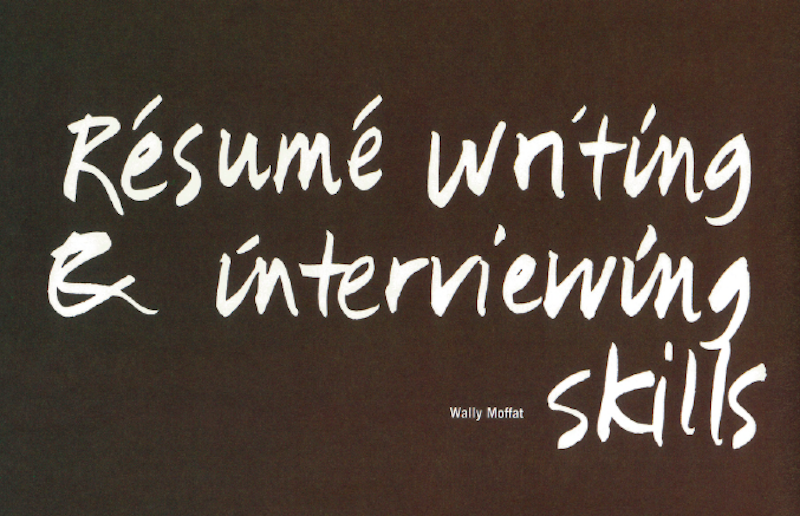
Resumé Writing and Interviewing Skills
For the first time in years, teachers have many excellent opportunities to move within their systems, to relocate to other jurisdictions, or to pursue positions of added responsibility. One in four teachers will leave the profession by 2003 and nearly half are likely to retire by 2008. Research shows the shortage of teachers will affect all grade and subject areas and all parts of the province. While boards and school administrators are looking forward to being able to hire more new teachers, most systems prefer to blend in a significant number of experienced teachers, whose classroom-management, instructional and interpersonal skills are already well developed.
For those who are considering a change of any kind, it is time to rewrite that résumé, and polish up those interview skills. Many teachers have not needed to update their résumés since their first job search, and have probably not been in an interview since being recruited for a teaching position.
Although there will be a large number of openings, it is important to be well prepared. Whether boards are hiring a few teachers or several hundred, they wish to hire the very best. Popular destinations receive huge numbers of applications and competition is very keen. Most important of all, you want to get the job you want, where you want it. With all that in mind, here are some guidelines for résumés that meet current expectations, and tips for the interview process.
The Résumé
- Make sure your résumé is no more than two pages long. Be clear and brief with lots of white space to make the information easily accessible. Many résumés are initially scanned in a minute or less.
- Start with your level of education. List your degrees, additional qualifications and other certification. Follow this with teaching experience, related and volunteer experience, skills, committees, achievements and personal interests.
- List references, preferably three, at the bottom of page two, then a permission statement to contact them. Have a good range of references, with at least one from an administrator.
- All sections must be in reverse chronological order.
- Use a consistent pattern and structure throughout, with neat margins and similar indentations. Make sure all points begin with action verbs in the same tense.
- Use the biggest type possible-12 point is good if you can. Use similar type faces throughout, boldface your headings and degrees. Do not use graphics or fancy script. Remember that many resumes are faxed or even transmitted electronically.
- Do not include your age, marital or family status. Definitely do not send a photograph.
The Interview
Résumés get interviews, and interviews get jobs. Whether competing with ten other teachers for a position in your own district, or applying to a large system that will hire several hundred people, prepare thoroughly.
- Review your skills and experience relative to the position or positions offered. Put your qualifications in the context of the specific job. Project yourself into the new role.
- Review the boards philosophy, directions and priorities, particularly if applying to a new district.
- Practice for the interview with colleagues, friends and mentors. Consider possible questions. Be prepared to discuss current educational issues.
- Consider your style, not just your content. Watch for speech mannerisms. Tape yourself in a mock interview.
- Think about the future. In many interviews, you will be asked about future plans and leadership aspirations. On interview day, arrive early to be composed and ready. Your physical image and first impressions for the interview team are tied closely together. The first few minutes in the interview are often decisive.
- Dress appropriately. While school dress is more casual and relaxed these days, the interview is a formal setting. Traditional clothing is still the best.
- Be conscious of body language; sit tall with head erect and make good eye contact. Avoid gestures such as pointing or finger-waving.
- Listen carefully and answer the question exactly as it was asked.
- Maintain your focus. Be specific and use concrete examples whenever possible.
- Ask for clarification if necessary and take your time. It is appropriate to pause before responding while you are framing and sequencing your answer.
- Be prepared to respond to a personal question such as “Why should we hire you?” Have your qualities, strengths and skills in order, and don’t be too modest.
- Make cautious use of humour; don’t let your judgment come into question. Don’t let cynicism, prejudice or intolerance creep into your answers. Avoid put downs or negative expressions.
- Avoid “ I guess” or “I might” or “perhaps” or “maybe.” Begin every statement in a positive, assertive fashion.
Getting the job you want is not rocket science. It will, however, take time and effort. The time you invest, however, could lead to enormous personal and professional satisfaction and more than repay your efforts.
Wally Moffat is an educational consultant and former teacher; principal and superintendent in Eastern Ontario. He is the author of “Getting The Job You Want, ” published in January 2000 by ETFO. This publication is available from Shop ETFO. Cost is $15.00, including taxes and shipping. For more information, call the ETFO Provincial Office at (416) 962-3836/1-888-838-3836 or Shop ETFO on line at www.etfo.on.ca